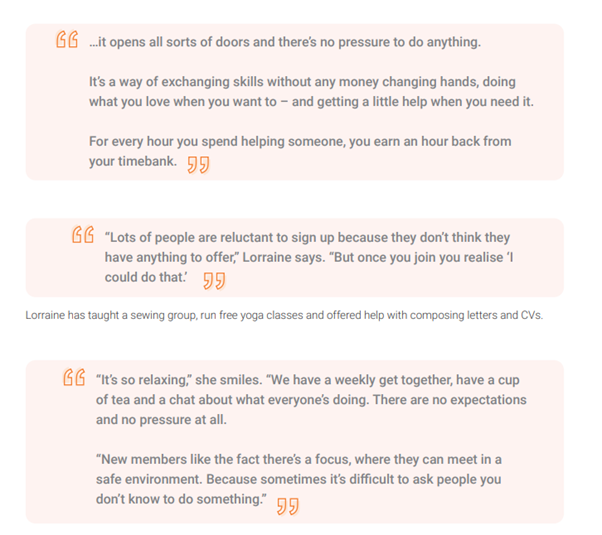Our vision
A country in which there’s a time bank in every community and on every high street, connecting and valuing people, and helping to eliminate loneliness.
Our mission
Timebanking UK is dedicated to empowering communities through the exchange of time and skills, fostering care, mutual support, and active citizenship. We exist to equip individuals and organisations with the tools, training, and sharing the knowledge needed to establish and sustain thriving time banks that unlock the potential of every person. By prioritising time as a currency, we nurture inclusive communities where everyone’s contributions are valued equally.
We will achieve this by:
- Providing specialist resources, expert guidance, and vital practical tools that allow time banks to flourish, building resilient local communities.
- Empowering emerging & potential hyper local leadership by implementing training and mentorship. This will enhance skills in community organising and the effective use of the timebanking model.
- Partnering with organisations and decision-makers at every level to promote local participation in timebanking, helping citizens build stronger, more connected communities.
- Shaping policy and practice by advocating for the integration of timebanking into local and national strategies, showcasing its power to strengthen communities and build social capital.
- Partnering with organisations and decision-makers at every level to promote local participation in timebanking, helping citizens build stronger, more connected communities.
- Conducting professional research within the timebanking community to assess its impact and benefits, identifying best practice and sharing with communities.
- Co-operating and collaborating with academic researchers to further explore the positive outcomes of timebanking on individuals and communities.
Our values
Our five core values are:
-
People are assets
The real wealth of our society is its people. We believe that every person is valuable and has something to offer other people in the community.
-
Redefining work
Time banks are helping to redefine “work” to include raising healthy children, preserving families, making neighbourhoods safe and vibrant, caring for the frail and vulnerable, and tackling injustice.
-
Reciprocity
We believe the impulse to give something back is universal. Timebanking enables people to be givers as well as takers. At a time bank, “you need me” becomes “we need each other”.
-
Social capital
Timebanking builds mutual social and practical support networks in communities, strengthening social capital and encouraging collaboration between community organisations and public services.
-
Respect
Time banks give people respect and recognise the value of everyone’s contribution by giving them the benefit of someone else’s time in return.
Why timebanking is good for society
Our economic system gives people the freedom to buy and sell goods and services. But, because interaction is so closely tied to financial exchanges, people soon feel excluded if they don’t have much money. If you’re not employed or don’t earn much, or if you’re housebound or suffer from chronic illness, you may soon begin to lose your sense of self-worth because so much of our personal identity depends upon what we ‘produce’ in monetary terms.
Time banking enables those without money to earn the same goods and services by earning the trust of others in their community. They are a social economy innovation that reward knowledge-sharing and physical work with social capital and personal fulfilment, thus nurturing networks of reciprocity. They bring people and local organizations together to help each other, utilizing previously untapped resources and skills, valuing work that is normally unrewarded, and valuing people who find themselves marginalized from the conventional economy (Han, Shih, Bellotti, Carroll, 2015).
The time bank members of Houghton and Wyton Timebank in Cambridgeshire said:

Timebanking also provides an equal platform for access. It allows people to access resources that might otherwise be beyond their economic means, such as training or help with housework.
Time banks are successful in attracting those who might not get involved in ‘traditional’ volunteering, including people with a low income and those who aren’t in formal employment. Only 16% of traditional volunteers have an income of under £10,000; nearly four times as many time bank participants do (58%). Of time bank participants, 72% are not in formal employment, compared with 40% of traditional volunteers (NEF, 2002: The Time of Our Lives).
The report, Social Mobility: Unleashing the Power of Volunteering, (2021) from Royal Voluntary Service, authored by Dr Eddy Hogg, Senior Lecturer in Social Policy at the University of Kent set out to explore the potential volunteering has to improve life chances. For one in ten volunteers, volunteering helped them move from state benefits, unemployment or redundancy into paid work, rising to 14% for those in their twenties and 12% for those in their thirties.
Reciprocity and equality are enshrined in timebanking exchanges through the principle of ‘an hour for an hour’. Because everyone’s hour counts for the same, timebanking can enable even the most marginalised and isolated people to realise a sense of self-worth and belonging, making society less fractured and more cohesive.
The late father of modern timebanking, Edgar Cahn, said timebanking exchanges “link people in a social network; each act of caring triggers a reciprocal act so that every transaction has social capital built in”.
Timebanking builds networks of people who give and receive support, enabling people from different backgrounds who may not otherwise meet to form meaningful connections and friendships. Generating social capital in this way can enhance health, wellbeing and resilience, all of which can prevent additional needs arising, saving precious resources as well as contributing to a foundation of co-production that transcends our standard economic dealings.

